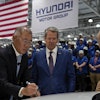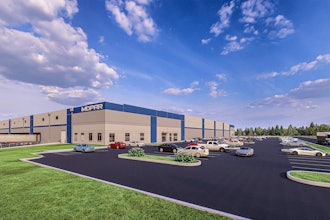
Automotive manufacturers need to rethink how they find, retain and develop tech talent
Octavius Salis spent six years in the Aerospace industry as an Air Force Electronics Technician. His first civilian job was as an Electronics Repair Technician at a manufacturer of building products.
Leveraging technical skills honed in both the air force and the building materials industry, in 2020 he was hired by BMW as an Equipment Maintenance Technician for the advanced robotics system of their M3 and X5 vehicles.
Stories about the success of advanced tech talent working in the automotive sector are becoming more familiar as the industry continues to digitally reinvent itself. Technology innovation is transforming most industries and clearly automotive is no different.
As a result, automakers are now finding themselves in increased competition for tech talent, requiring a more resourceful and adaptable approach to talent acquisition.
How excited is advanced tech talent about working in automotive?
Now that vehicles are becoming supercomputers on wheels, you would expect the industry to hold great appeal to tech workers. With the increasing demand for electric vehicles; the integration of AI, big data & analytics and 3D Printing into the car-making process; and the use of Human-Machine Interface (HMI) that allows drivers to interact with their vehicles, the future of the automotive industry is one of vision and innovation.
While this may sound promising for auto industry recruiters, many tech workers today are far more excited at the prospect of careers in industries such as aerospace, renewable energy and biotech than they are by working in automotive.
This is largely rooted in the perception – especially by younger tech talent − that the automotive industry just does the same thing every day on an assembly line with stagnate technology. The singular exception to this misconception is Tesla Motors, the manufacturer that has cornered the EV market with its innovation, power and trendy functionality.
Adding further to the hiring woes of auto employers, the recent wave of tech industry layoffs is creating a candidate environment of hesitancy among top tech talent to leave their current employers or the industry where they feel confident of their skills and roles.
New realities of hiring: less focus on auto industry experience, more emphasis on training
Clearly, automotive employers need to retool the passive recruiting processes they’ve relied on for years and begin to have more in-depth conversations with candidates about their industry’s innovative advances and promising future.
Here are five hiring truths companies need to recognize and address to meet the challenges of hiring advanced tech talent from outside the automotive industry:
Auto industry experience is not required
Tech talent without specific industry experience can still be successful in facilities roles. The key here is to understand the commonalities between the industries, learn how to interpret resumes and to recognize the quality and relevance of achievements.
For example, an equipment technician working in the etching department at an electronics company can fully impress an automotive hiring manager with her technical acumen, understanding of and strict adherence to safety protocols and ability to quickly transfer her skills.
Since similar titles can mean different things in different industries, learning how to assess transferable skills can be challenging. One way to address this is to take advantage of opportunities to speak at length with candidates who will eagerly talk about their technical proficiencies.
The same holds true for soft skills. Consensus that a candidate is a critical thinker, good communicator and flexible team player helps address concern about lack of specific auto industry experience.
Talking with past managers and co-workers is also useful in gauging an individual's ability to readily adapt to a new workplace environment. As the complexity of skills needed in automotive increases, it’s important that recruiters also pay attention to soft skills rather than a sole focus on finding individuals whose hard technical or industry skills specifically match the job requirements.
Tell a more enticing story
Recruiters need to be equipped to educate and excite potential job seekers about the current and future role technology plays in the automotive industry.
Whether through prepared presentations, educational videos or employee interviews, the goal is to share inspirational stories that showcase your company’s technological achievements and demonstrate how technology and innovation are an integral part of every line of business.
Conduct meaningful interviews to discover if a candidate has the talent to get the job done today − and tomorrow
Because tech talent may act and think differently than non-technical candidates, interfacing with these individuals on a more meaningful level may require rethinking how you conduct candidate interviews.
For example, rather than asking specific questions about the types of software applications they’ve coded or equipment worked on, ask candidates more generalized, open-ended or critical thinking questions.
This can help hiring teams gauge their baseline level of knowledge, determine how they can provide value today and be reskilled for the long term.
To make candidate interviews more comfortable, involve your current tech workers in the interviewing process. Because they both speak the same technical language, conversations will flow more easily and excitement will grow.
Make professional development and training a priority from day one
Hiring for skills and potential should be the primary criteria for hiring decisions, especially considering current market challenges. Having formalized training programs in place ensures that candidates with years of technical acumen are able to be paid according to their skills and experience and gives younger talent a sense of purpose and vision for their future in the organization.
Whether re-skilling an experienced engineer or training a less skilled technician, internally grown talent is grateful and more loyal, addressing one of the auto industry’s biggest challenges: retention.
Military veterans are an excellent source of advanced tech talent
Junior Military Officers and Military Technicians receive unmatched technical training during their years of service and are well tuned in to the relationship between quality, maintenance, safety and the people they manage.
They are an ideal fit for technical roles across the auto industry including maintenance technicians, quality and improvement engineers, technical product managers and electrical/systems engineers. Honda and BMW are great examples of automotive companies that have dedicated and robust military hiring programs that find meaningful roles for veterans while adding tremendous value to the company.
As the industry braces for even more technological disruption and its impact on buying behaviors, creating realistic strategies to attract and retain today’s tech talent should be an ongoing investment for auto manufacturers.
Take the first steps now by learning to understand how advanced tech talent thinks and works and the benefits their knowledge and skill bring to your workplace. You will be pleasantly surprised to learn how many of these talented professionals meet both your immediate and long-term hiring needs.
---
Daniel Jacob, a former U.S. Navy industrial electrician, is now a recruiting leader at Orion Talent in the manufacturing space. Email:[email protected]























